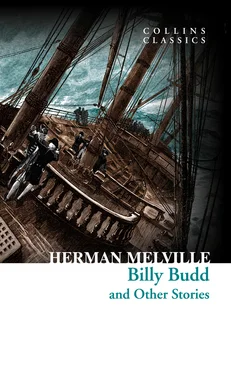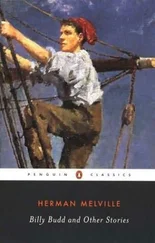Ishmael is representative of the moderate Christian—the meek who inherits the Earth, one might say. He came along for the ride and remained unharmed while hell raged around him, protected by his faith.
This premise is largely the reason the book became a classic in the American canon, because it is interpreted as a cautionary tale and a fable. The moral of the story is that those who keep their heads down will triumph in the end.
Herman Melville found inspiration for Moby Dick by sailing on a whaler to the Pacific Ocean in 1841–1842. He then went AWOL from his ship and lived among the natives on the Marquesas Islands. After a number of weeks he boarded another whaler and traveled to Honolulu, Hawaii. He eventually returned to the U.S. mainland in 1844.
Melville was displeased at witnessing Christian missionaries in Hawaii forcing their faith on the natives, who had their own beliefs. Although he was a Christian himself, he saw that extreme righteousness was ethically questionable. This was the seed for Moby Dick , which questions the virtues of extreme beliefs.
Before Moby Dick , Melville had published a number of novels alluding to his seagoing adventures, but he never made a great deal of money from any of his work. During the writing of Moby Dick , he became a friend of Nathaniel Hawthorne, to whom he dedicated the book.
Melville spent the remainder of his working life as a customs officer for New York City. By the time he retired, few people remembered his past as an adventurer and novelist. He became an alcoholic, but his wife stuck by him and helped him recover. In sobriety he struggled with bouts of depression until his death at the age of seventy-two. It had been almost forty years since his writing career had ceased, but that hadn’t stopped him from continuing to write for his own pleasure.
In a way Melville’s own journey from adventurer, to novelist, to obscurity is part of the legend. Because he never tasted real success in his own lifetime, it is tempting to wonder what he might now think about the literary legacy he left behind. After all, Moby Dick is now regarded by some as the best American novel ever written.
Billy Budd was published posthumously in 1924, long after the death of Herman Melville in 1891. The author had left the unfinished manuscript among his papers but it wasn’t discovered until 1919, some thirty years after it was begun.
Set in the late eighteenth century, the eponymous central character, a sailor, finds himself subject to a court-martial after accidentally killing a fellow sailor whilst being questioned about a rumour of mutinous behaviour. Billy is a good man, and the one witness to the event can testify that it was an accident, but despite this there are disastrous consequences.
In the novel, Melville addresses the different ways in which a person is viewed by society, and how this can ultimately determine their fate. Initially Billy is presented to the reader as a mild-mannered and affable man. He even blesses the captain who orchestrated his downfall, being too naïve to realize that he always held the power to save him.
However, later in the book we read a published account of the court-martial, which paints Billy as a scoundrel who deserved his punishment. In addition, a ballad written by one of his shipmates suggests that he wasn’t quite as innocent as the reader has been led to believe. The end result is that the reader finishes the novel unsure of Billy’s true character. Was he an honest man who got caught up in unfortunate circumstances, or a rogue who was responsible for his own undoing?
In many ways it is an early prototype for courtroom drama, altering the reader’s perception of the main character based on the evidence as it is revealed. Melville’s tale is partly an analysis of the moral judgment of others—emphasizing that it is human nature to oscillate between contradictory opinions of a person, whether in a court of law or otherwise—and it is this that makes the tale so intriguing.
After the publication of his epic masterpiece Moby Dick in 1851, Melville experimented in short fiction, a style that had been popularized in America by Edgar Allan Poe. A departure from the maritime settings of his previous novels, Bartleby, the Scrivener explores the mundane existence of Bartleby, a Wall Street pen pusher. In Las Encantadas Melville employs the short story form in ten philosophical sketches, narrated by an anonymous voice and each exploring a different, and increasingly darker, side of life on the enchanted Galapagos Islands. In Benito Cereno Melville is back in familiar territory as he examines the life of a sea captain in the midst of a slave rebellion. Encompassing a range of themes and characters, Melville’s novellas showcase his distinctive writing style in shorter form.
CONTENTS
Cover
Title Page
Copyright
History of Collins
Life & Times
BARTLEBY, THE SCRIVENER
BENITO CERENO
LAS ENCANTADAS OR, ENCHANTED ISLES
BILLY BUDD
Dedication
Chapter 1
Chapter 2
Chapter 3
Chapter 4
Chapter 5
Chapter 6
Chapter 7
Chapter 8
Chapter 9
Chapter 10
Chapter 11
Chapter 12
Chapter 13
Chapter 14
Chapter 15
Chapter 16
Chapter 17
Chapter 18
Chapter 19
Chapter 20
Chapter 21
Chapter 22
Chapter 23
Chapter 24
Chapter 25
Chapter 26
Chapter 27
Chapter 28
Chapter 29
Chapter 30
CLASSIC LITERATURE: WORDS AND PHRASES adapted from the Collins English Dictionary
About the Publisher
I am a rather elderly man. The nature of my avocations, for the last thirty years, has brought me into more than ordinary contact with what would seem an interesting and somewhat singular set of men, of whom, as yet, nothing, that I know of, has ever been written—I mean, the law-copyists, or scriveners. I have known very many of them, professionally and privately, and, if I pleased, could relate divers histories, at which good-natured gentlemen might smile, and sentimental souls might weep. But I waive the biographies of all other scriveners, for a few passages in the life of Bartleby, who was a scrivener, the strangest I ever saw, or heard of. While, of other law-copyists, I might write the complete life, of Bartleby nothing of that sort can be done. I believe that no materials exist, for a full and satisfactory biography of this man. It is an irreparable loss to literature. Bartleby was one of those beings of whom nothing is ascertainable, except from the original sources, and, in his case, those are very small. What my own astonished eyes saw of Bartleby, that is all I know of him, except, indeed, one vague report, which will appear in the sequel.
Ere introducing the scrivener, as he first appeared to me, it is fit I make some mention of myself, my employés , my business, my chambers, and general surroundings; because some such description is indispensable to an adequate understanding of the chief character about to be presented. Imprimis: I am a man who, from his youth upwards, has been filled with a profound conviction that the easiest way of life is the best. Hence, though I belong to a profession proverbially energetic and nervous, even to turbulence, at times, yet nothing of that sort have I ever suffered to invade my peace. I am one of those unambitious lawyers who never addresses a jury, or in any way draws down public applause; but, in the cool tranquillity of a snug retreat, do a snug business among rich men’s bonds, and mortgages, and title-deeds. All who know me, consider me an eminently safe man. The late John Jacob Astor, a personage little given to poetic enthusiasm, had no hesitation in pronouncing my first grand point to be prudence; my next, method. I do not speak it in vanity, but simply record the fact, that I was not unemployed in my profession by the late John Jacob Astor; a name which, I admit, I love to repeat; for it hath a rounded and orbicular sound to it, and rings like unto bullion. I will freely add, that I was not insensible to the late John Jacob Astor’s good opinion.
Читать дальше












